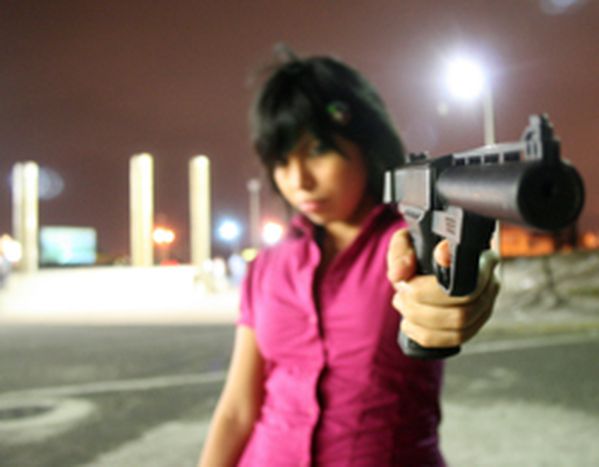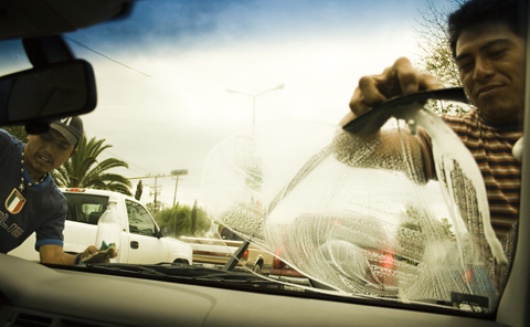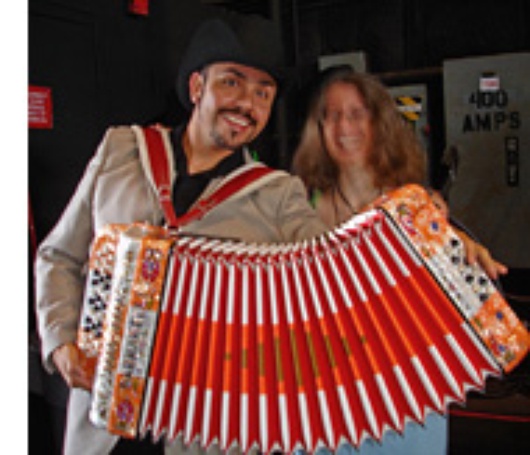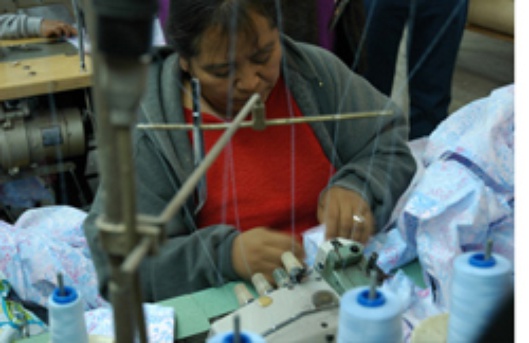
As drugs and violence rise, Mexico's democratic hopes fall
Published on
Translation by:
 John Smith
John Smith
Mexicans are losing confidence in their institutions, justice is absent, women are murdered and narcotics traffickers keep the pressure on an increasingly violent society
Seven years have already passed since July 2000, when Mexico thought it had secured a democratic future. The country had put an end to 71 years of an authoritarian and corrupt regime by the institutional revolutionary party (IRP). But, for Mexican society, the country continues to stagnate. Insecurity reigns: 411 complaints of aggression are reported in Mexico City daily.
Corruption on all levels
The social order is weak and the justice system is to blame. Drivers won't even obey the rules of the road in the city. Thanks to corruption, piracy is everywhere. Even the teacher's union sells jobs within the national education system. Politicians fill their pockets. The fact is that everyone cheats and anything that appears to be within the law is just an illusion. Consequently, many conflicts are settled in radically. Mexico has one of the highest homicide rates in the world (15 murders for every 100, 000 inhabitants, ten times more than the European average).
 Cleaning windows for 5 pesos in La Puebla de los Ángeles (Photo: beto (kuh)/ Flickr)
Cleaning windows for 5 pesos in La Puebla de los Ángeles (Photo: beto (kuh)/ Flickr)
Elena Azoala, sociology professor and councillor to the republic's general prosecutor, explains that ‘the fundamental causes behind the violence are tied to enormous inequalities in society. It's not only poverty which explains it, but the gap that exists between those who earn very little, and the immensely wealthy.’ Its unbelievable that Mexico has 12 multimillionaires when 60% of its population lives with less than 3 dollars per day!
The hidden unemployment rate is equally very high. Most people don't make enough money to live decently. A world which has to survive through poverty creates delinquents, in particular young people who can't find any work except through the illicit economy, and having to make do with drugs, theft, prostitution, pirating or contraband.
Fight against the cartels
Confrontations with the cartels are well covered in the media, as they are generally  very spectacular: settling accounts in plain view, decapitations, gory executions, fabulous seizes of tons of cocaine. This violence fascinates certain stratum in society, giving birth to a kind of narco-culture with its emblematic narcocorridos ('drug-runners'), romanticising their exploits in trafficking drugs, and turning violence into a banality through their songs.
very spectacular: settling accounts in plain view, decapitations, gory executions, fabulous seizes of tons of cocaine. This violence fascinates certain stratum in society, giving birth to a kind of narco-culture with its emblematic narcocorridos ('drug-runners'), romanticising their exploits in trafficking drugs, and turning violence into a banality through their songs.
For Catherine Heaux, a specialist in narcocorridos, this trivialisation is very serious : ‘These songs sell millions of copies, giving value to male chauvinism, corruption, money, personal success without any morals, sending us back to a social universe where nothing is shocking,’ she denounces. ‘This means that all the work that went into democratising Mexico has not even found an echo in these people. It's a return to fatalism: for them it's better to live like a king for just five years, rather than to live poorly for 55 years.’
The situation is like the one we had in Columbia during the eighties, the same degree of penetration by the cartels into the structure of the state, and the same generation of violence. To fight against them, since 2, 000, governments for the transition to democracy are going to war head on with drug trafficking. 25, 000 traffickers, more than 100 of whom were drug barons and financial operators, have already been arrested.
Mexico’s murdered women
 More than 7, 000 women in Mexico were murdered between 1999 and 2006 : that's the official number, not including homicides: ‘Unfortunately it’s nothing more than the tip of the iceberg of violence in general, tolerated by the state who never reformed anything to put an end to this phenomenon,’ emphasises Marcela Lagarde from the International Union of Women. ‘In the majority of cases, justice has never found the guilty, nor made any arrests.’
More than 7, 000 women in Mexico were murdered between 1999 and 2006 : that's the official number, not including homicides: ‘Unfortunately it’s nothing more than the tip of the iceberg of violence in general, tolerated by the state who never reformed anything to put an end to this phenomenon,’ emphasises Marcela Lagarde from the International Union of Women. ‘In the majority of cases, justice has never found the guilty, nor made any arrests.’
Violence against women finds its paroxysm with the deaths in Ciudad Juarez. In this town on the border in northern Mexico, there are maquiladora or 'screwdriver' factories which principally employ women. Five hundred young women, mostly single, have been found murdered, violated, mutilated, and neither government under Vicente Fox or Felipe Calderon have done anything about it.
Maria Lopez Urbina, the special judge hired by Vicente Fox to retake up one of the cases, interviewed the victims’ parents. Six months later, she submitted her conclusions to the president, showing that there were more than 100 anomalies in the reports administered by the police, the public minister and even the judges. She found negligences, omissions, and constant obstructions to the justice system – in short, total corruption. Maria Lopez Urbina was then fired. That's how we measure institutional violence!’ underlines Marcela Lagarde.
In-text photos: La Puebla de los Ángeles (beto (kuh)/ Flickr), don't confuse the narcocorrido musicians with the narcocorrido drugrunners of the same name! (bunchofpants/ Flickr), inbox photo is a maquiladora in Tijuana (andy_wallis/ Flickr)
Translated from Drogues et violence : les espoirs démocratiques du Mexique s’effondrent


